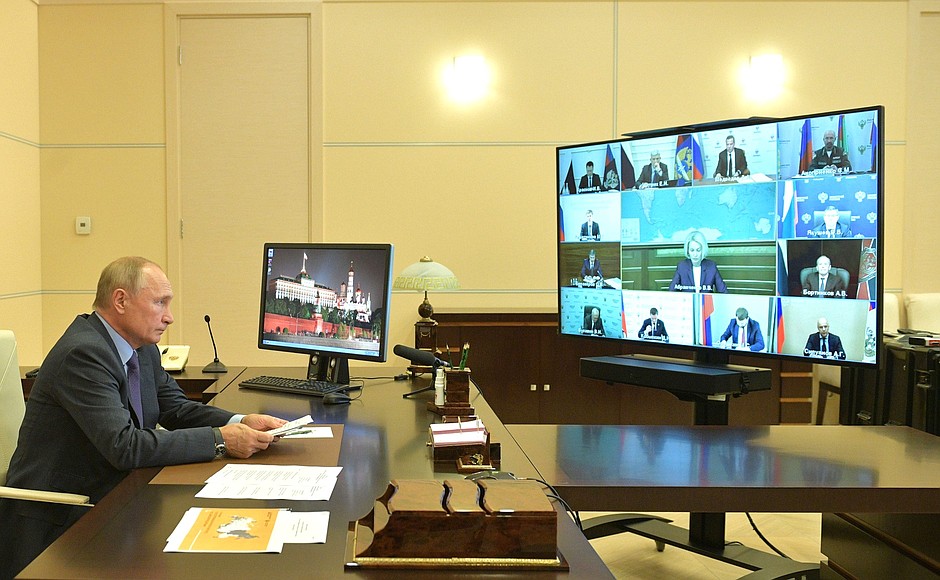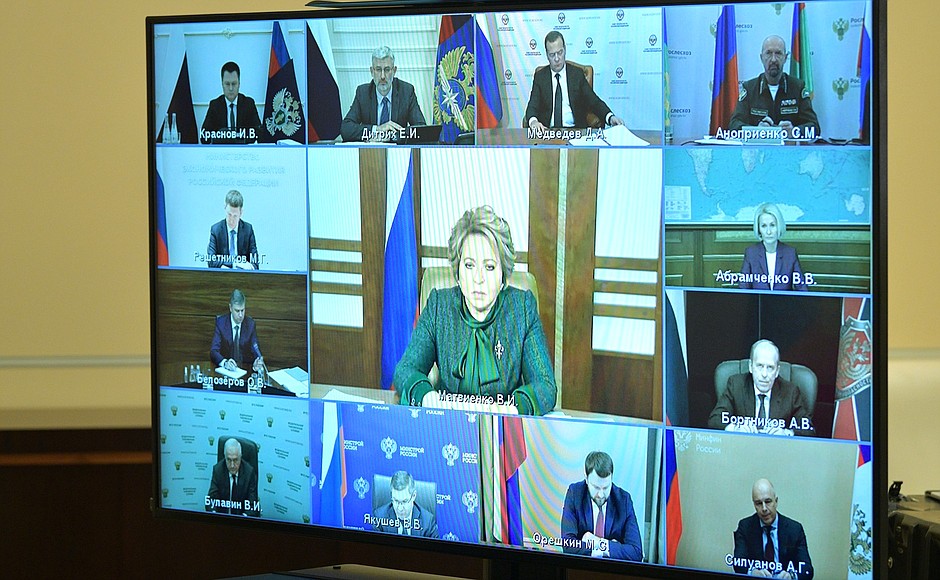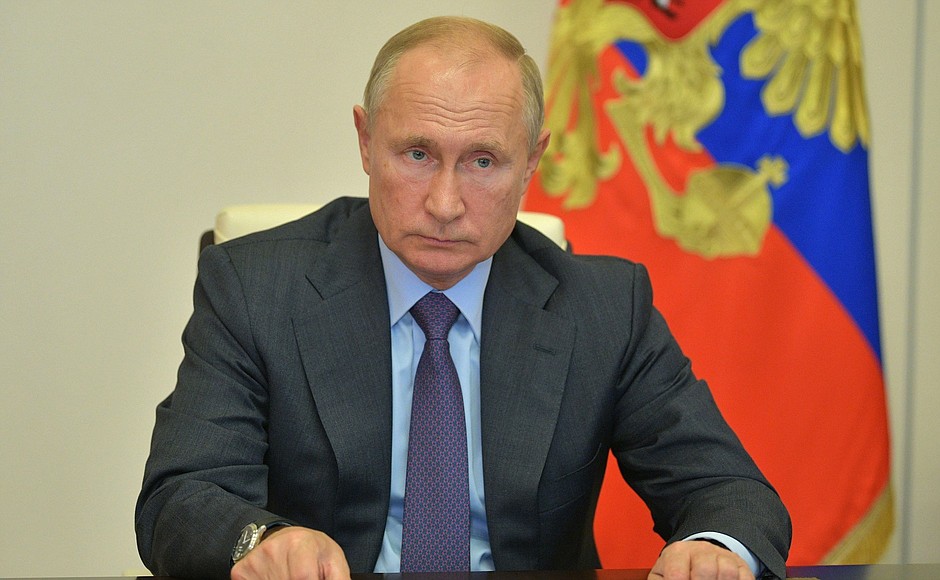Taking part in the meeting were Federation Council Speaker Valentina Matviyenko, Prosecutor General of the Russian Federation Igor Krasnov, Chief of Staff of the Presidential Executive Office Anton Vaino, Deputy Chairman of the Security Council Dmitry Medvedev, Deputy Prime Minister Viktoria Abramchenko, Presidential Aide Maxim Oreshkin, Minister of Transport Yevgeny Ditrikh, Minister of Natural Resources and Environment Dmitry Kobylkin, Interior Minister Vladimir Kolokoltsev, Minister of Industry and Trade Denis Manturov, Minister of Economic Development Maxim Reshetnikov, Minister of Finance Anton Siluanov, Minister of Construction, Housing and Utilities Vladimir Yakushev, Director of the Federal Security Service Alexander Bortnikov, Deputy Minister of Natural Resources and Environment and Head of the Federal Agency for Forestry (Rosleskhoz) Sergei Anopriyenko, Head of the Federal Customs Service Vladimir Bulavin, Special Presidential Representative for Environmental Protection, Ecology and Transport Sergei Ivanov, and CEO and Chairman of the Board of Russian Railways Oleg Belozerov.
* * *
President of Russia Vladimir Putin: Colleagues, good evening.
At our meeting tonight, we will consider the situation in the Russian timber industry. I have long wanted to do this.
We will discuss the current situation and problems in the industry and its future development goals, considering that it is not just one of the important traditional industries in our country, but also, in the fullest sense of the word, our natural heritage that has global environmental significance. Russia has one-fifth of all forests on the planet.
As we know, at the turn of the century, the domestic forestry industry was in decline. Over the last decade of the 20th century, Russia's share in the world trade in timber products decreased dramatically from 18 to 2 percent. Why? Because the so-called grey schemes for the allocation of forest plots became widespread practice, and in general, fraud flourished as never before, plundering reached an unheard-of scale and reckless and illegal logging became frequent.
All this considered, we certainly could not expect any confident development, modernisation, creation of new jobs or proper reproduction of Russia’s forest potential.
In 2006, a radical reform was implemented in this sphere, and this essentially became the first attempt to establish law and order. A new Forest Code was enacted, which stipulated that Russian regions were authorised to manage forest resources, and monitor and oversee their use. Auctions for the right to use forest resources began to take place, and those leasing forest sections were made responsible for protecting the forests and ensuring their reproduction. Of course, we must discuss the efficiency of all these measures, but this was done to rectify the situation.
Since then, the area of leased territories has soared by one-third, and nationwide timber procurement volumes have increased by 50 percent. Considerably more value-added goods, including plywood, pulp, paper, furniture and pellets, began to be manufactured. To the best of my knowledge, production of pellets has skyrocketed 63 times over.
At the same time, the national forestry industry faces numerous problems. Obviously, a lot of systemic issues remain.
Unfortunately, most regions retain purely archaic and consumerist approaches towards using forest resources, despite the industry’s overall development, stronger timber industry holdings and the appearance of new production facilities. As I have said, this is our heritage. Unfortunately, the guiding principle remains the same: to reach the target volumes at any cost. They do not care what happens, if no grass will grow afterwards. Well, no grass or forests grow because of such practices. In effect, they are using the so-called extensive models when the trees are cut down en masse. Quite frequently, this takes place at a low, if not to say barbaric, technological level, and the task of restoring forests is ignored completely.
Furthermore, the development of Russia’s forestry complex faces obvious imbalances. I will explain what I mean. The sector’s leading processing companies are located far away from the main end-product consumption centres, primarily those in the entire Asia Pacific region, which is marked by a favourable price situation and rising demand, including for environmentally friendly fuel, the very same pellets that I mentioned earlier.
At the same time, our Far Eastern regions, which have a competitive market potential due to cheap timber and a short shipment distance, are so far unable to use these advantages to increase deep processing in their timber sector.
Instead, they continue to export raw timber and low value-added goods. Moreover, they often use all kinds of grey or openly criminal export schemes. Bluntly speaking, this is illegal traffic.
I would like to point out a rather recent but still unresolved problem: illegal tree felling. We have been fighting it systematically, but it takes more than just consistency. We need fundamentally new, more efficient, modern and, most importantly, effective methods.
Today I would like you to report specifically on what you are planning to do to decriminalise the timber industry, cut short unfair competition practises and strengthen the domestic companies’ positions on foreign markets.
And lastly, a common problem in the industry is the insufficient number and low quality of forestry measures aimed at protecting and reproducing our forests, ensuring reforestation and preventing forest fires. The industry is chronically short of resources for this, which is having a direct negative impact on our forests and the industry’s future development.
As you know, I have raised this issue more than once, and met with community activists. The issue is being addressed by the Russian Popular Front, ecologists and involved individuals. However, we are not doing enough to restore order in this sphere in the best interests of the nation.
Today we will listen to Government reports on this issue. I hope to hear practical proposals. I have discussed various scenarios with some of my colleagues, but today I would like to see finalised proposals for settling the main problems of the Russian timber industry and for creating conditions for its long-term comprehensive development.
Let us begin.
<…>
Vladimir Putin: Colleagues, what would I like to say in conclusion?
First of all, you know about the criticism and complaints from public organisations and environmental bodies regarding the level and quality of our work. I find these complaints and criticism fair. I do not think that all the government bodies at every level are efficient in this area. Unfortunately, this is not the case.
Of course, I would like to thank you for your constructive efforts in preparing for today’s meeting and for the proposed approaches to solving the problems persisting in the timber industry.
To summarise the results of our discussion today, I would like to say the following. Firstly, everything I will say is based on your proposals. The proposals made during this meeting today need to be thoroughly reviewed, and the draft list of instructions needs adjusting.
There is absolutely no doubt that extensive action is required, across a number of areas. We need to build an efficient management structure in the timber industry, most decisively and using accumulated experience. We need to consistently and, I would even say, strictly deal with decriminalising the industry. What is happening in the industry right now goes beyond all limits. We must improve the quality of government oversight over the timber industry and create the conditions and a solid foundation for its steady growth and development.
In view of the proposals submitted today, I am asking the Government to develop a legislative and regulatory framework for addressing the following tasks.
First, we must finally erect a barrier against the uncontrolled export of unprocessed timber. We have discussed this multiple times. But it requires a more extensive use of modern digital technologies (I fully agree with the proposals made here); it requires the launch of a federal information system for the timber industry, including a state electronic timber registry operating according to rules common for all Russian regions.
Timber and related transactions need to be accounted for within a single system. We heard today that in some cases, transactions are carried out for one amount while a different amount was produced. This measure is necessary to make sure we can track the entire activity, from timber felling to the finished products and their export outside the Russian Federation.
This measure would help eliminate loopholes, shady schemes and remove the illegal aspect of the timber business while making the operation of honest companies more convenient.
The timber and timber-related transaction accounting system must be launched in pilot mode on January 1, 2021, and it must become mandatory from July 1, 2021.
In addition to this, I believe that we must adopt a strict rule: if a company or entrepreneur does not have commercial timber harvesting rights, they must be prohibited from having their harvesting equipment there. We should analyse Mr Kolokoltsev’s proposal on the confiscation of such equipment.
We must also revise the functioning of our customs service, so that round timber is not exported under the guise of sawn timber.
In this context, I am instructing you to introduce as of January 1, 2022, a complete ban on the export of rough timber or presumably processed coniferous or valuable hardwood timber, as the deputy prime minister has proposed.
I suggest that we launch a special modernisation programme for small and medium-sized enterprises in this sector based on the facilities of the Industrial Development Fund, as the Industry and Trade Minister has proposed. The idea is to introduce easy loans for the purchase of new equipment and for creating facilities for the deep processing of timber. We must launch the programme as early as January 1, 2021. I am asking you to allocate the necessary funds for this. I know that you have finished working on the budget, on the whole, but this provision must be taken into account.
Next, we must readjust the forest management and control mechanisms (I fully agree that this must be done, we also spoke about it today), starting with the reform of the forestry development system as the basis for forest accounting, planning, stocktaking and assessment, as well as clearly delineate the powers of the federal, regional and local authorities.
In addition to this, I suggest introducing a legal mechanism for the administrative survey of forest plots. We must widely use modern cutting-edge remote probing methods, including drones and the like. There are very many opportunities for doing this today.
Also, I propose establishing the post of chief federal state forest inspector in the regions and extending the powers of forest supervision to timber transportation, storage and processing, as it has been proposed today.
I would like to emphasise that all these issues require a careful and balanced approach to the redistribution of power between the various levels of government. But this must be done. I am asking the Government to run pilot projects in several selected regions during 2021, and later on, we will discuss extending this practice to the rest of the country.
Finally, the third task is business development and stimulation of the consumption of timber products by the Russian economy. We also spoke about this today. Mr Yakushev, the Minister of Construction, also spoke about this – about the demand. What we need to do is create the right conditions for domestic investment in the timber industry, such as building pulp and paper and processing facilities and implementing projects to grow saplings. And of course, as Mr Ivanov said, we need to check that the saplings are actually planted.
There are great prospects for the development of wooden housing construction, as the Minister of Construction said, with pre-made house kits. We need to remove all legal barriers in order to develop this segment. It is important for addressing people’s housing problems – they will have additional opportunities to build their own homes – as well as for the development of the construction industry, and for creating more jobs at timber processing enterprises.
And of course, I also ask you to focus on strengthening the industry’s personnel potential, on arranging modern working conditions and ensuring decent wages for timber industry workers.
In particular, I propose extending to them the state support policy that young specialists in rural areas are entitled to. First of all, this concerns help with the acquisition or construction of homes.
So let us work on it, let us have another go at it, seriously, to ensure that no one in our country has any more concerns about the future of Russian forests – indeed our national treasure. On the contrary, we will make sure that this industry grows, develops consistently, energetically, efficiently, and brings returns for the development of the national economy as well as gaining a foothold in the world markets.
The list of instructions needs to be finalised in accordance with the comments made during this meeting.
Thank you.

















